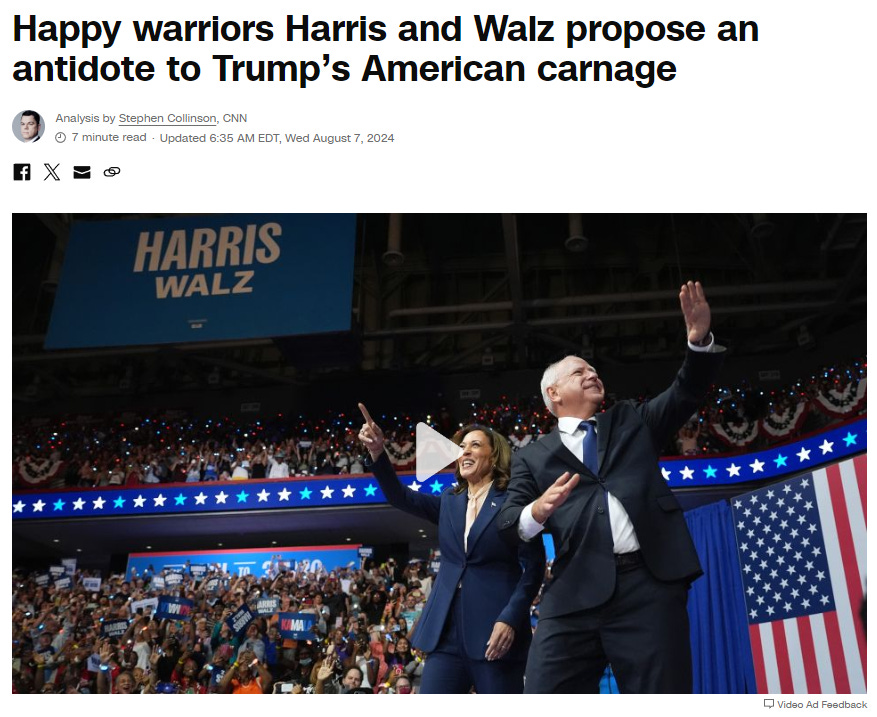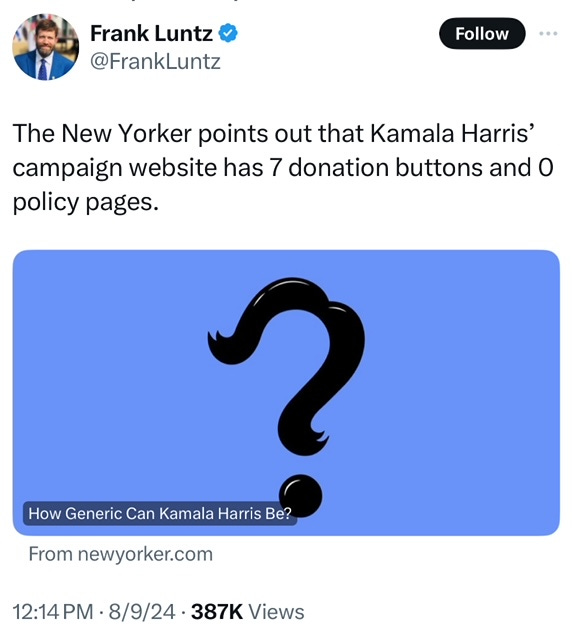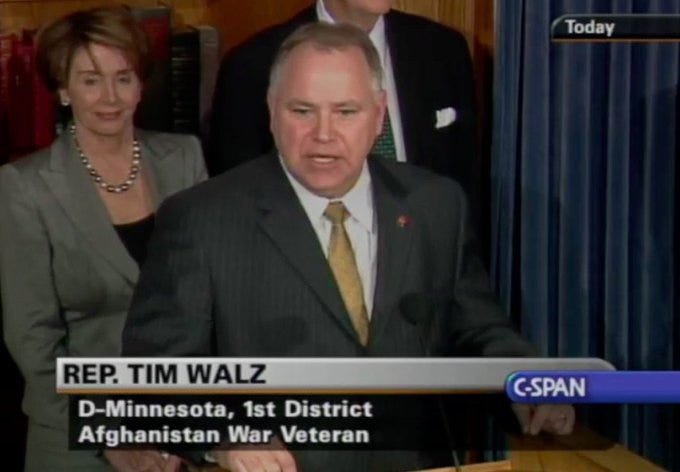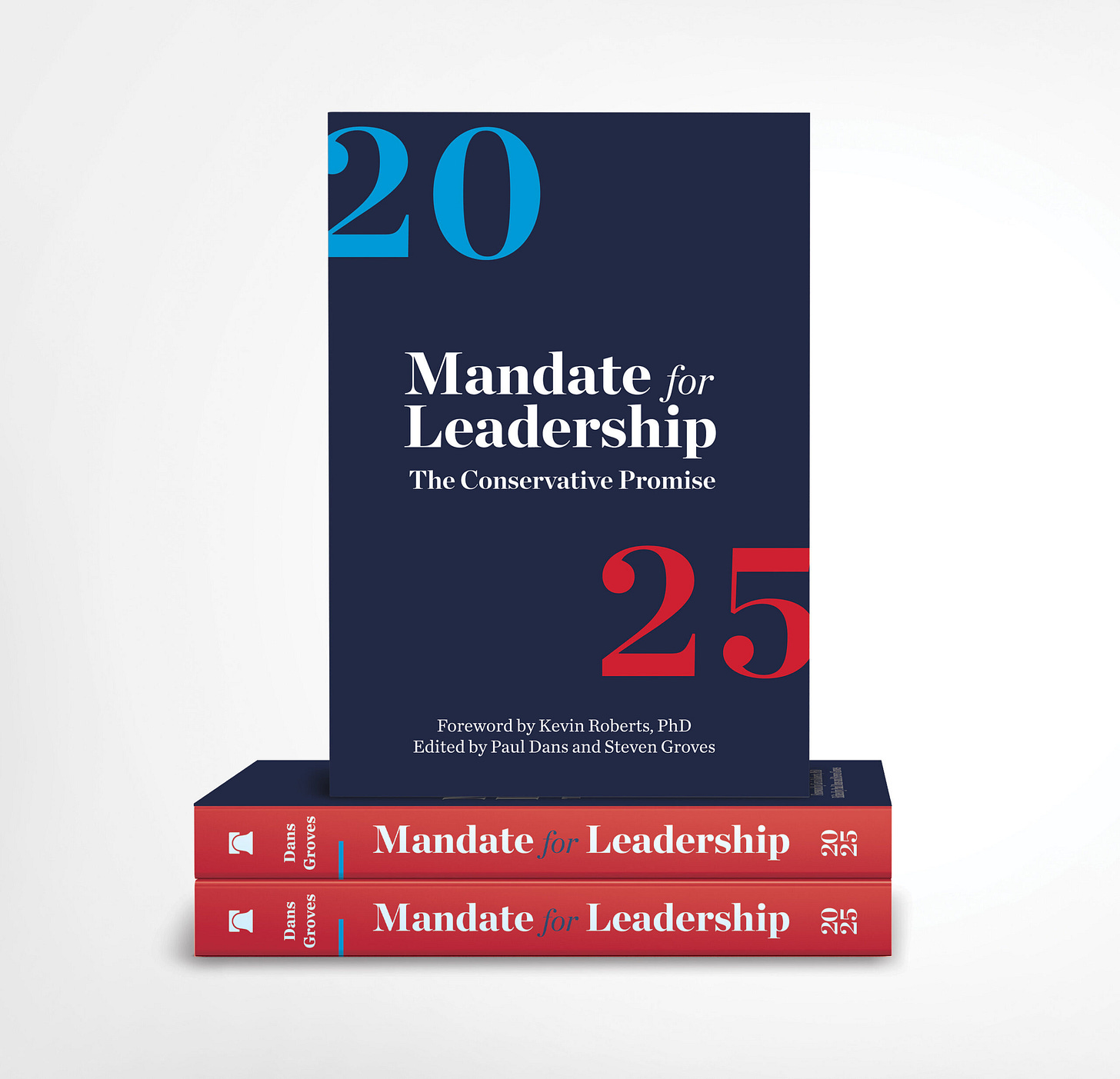A Style vs. Substance Election
"When you’re trying to win an election, vibe is king...Unfortunately, the Founding Fathers were right about one thing: When you have an uneducated and lukewarm society, you get voting by vibe."
The aforementioned quote is from author Aubrey Gulick at The American Spectator. She adds,
“Tim Walz and Kamala Harris have a very different vibe. Even though Walz enabled and Harris funded the BLM riots that turned Minneapolis into a warzone in 2020, they’ve been labeled ‘happy warriors.’ And CNN isn’t the only one. Walz has been described on television as ‘cuddly,’ ‘happy,’ and ‘authentic.’ He has a decent smile and, allegedly, a down-to-earth, personable attitude. All of this is very cute and incredibly dangerous.”
What does “vibe” actually mean, especially in the context of a “vibe election? One internet search (I pay to use Kagi.com, not Google) calls it “a distinctive emotional aura experienced instinctively.” Then there’s this definition from Cambridge:
Or, as my favorite online “newspaper,” The Free Press, started off a recently post:
“This is an election about vibes—God forbid we should have any understanding of where, say, Kamala Harris stands on anything; we just want to see her laugh to Beyoncé tunes. So the beer question—meaning, which candidate would you rather grab a beer with—is sort of the only one that seems to matter. In short, would you like to grab a glass of Chianti with Kamala?”
It’s all about the feels. You can disengage everything above your shoulders.
You remember your high school, junior high, or elementary school class elections. I remember the first time I ran for vice president in Ms. Gibson’s fifth-grade class at Southern Hills Elementary School in southwest Oklahoma City in 1966. It was an excellent little exercise to introduce us to campaigns and elections.
I remember it well. I drew insects on my campaign posters because I was a massive fan of the Volkswagen Beetle, a car whose origins I was only vaguely familiar with as a ten-year-old. It was, admittedly, weird. I was obsessed with cars. Most young boys are, but not Volkswagen Beetles. But the fact is that I wasn’t popular (weird, perhaps), and my opponent, a friendly, soft-spoken, and very intelligent young lady with a big smile and the best grades in class, defeated me handily. Twice. Identifying with a weird-looking foreign car didn’t help. I wouldn’t win anything until I was elected student body president in college almost a decade later, mostly because I ran unopposed. There were no insects on my campaign posters.

I just liked the Beetle's vibe. My father would buy three of them during my formative years. It was one of the best-selling cars in the world for the longest time.
“Vibe” and “Weird” have become the catchwords of a remarkably vapid August. And the Kamala Harris campaign wants to keep it that way, now that she’s raised not only a boatload of money but pulled even with Donald Trump in most key state polls (there are only six truly crucial states: Arizona, Nevada, Wisconsin, Michigan, Pennsylvania, and Georgia, with a couple of others on the cusp. Trump lost all those states narrowly in 2020). The national polls frankly do not matter.
Given all that’s happened in the past 30 days, from the assassination attempt on Donald Trump to Minnesota Gov. Tim Walz’s surprise selection as Harris’s running mate, I will ignore most polling until after the Olympics and Labor Day weekend. By then, average folks will be back home from vacation, their kids will be back in school, and they will realize that early voting starts around September 20 in Minnesota and Virginia, with many other states following in hot pursuit in early-mid October.
Two things are becoming clear: both major party candidates are running base campaigns in what they perceive to be a polarized environment, and for who remains, it is likely to be a “style versus substance” election. When you hear “vibe,” that means style. When you hear or read “substance,” that means issues and policy.
Both include comparing and contrasting the candidates and their running mates, although the latter will mean less and less as the election approaches. After all, both running mates—US Sen. JD Vance (R-OH) and Gov. Tim Walz (D-MN)—are two of the past month’s biggest stories, their selections helping define the top-of-the-ticket candidates who chose them, as in to reinforce their philosophical or ideological stamp on the ticket and their party. Veep candidates rarely matter in the end. Their 15 minutes will probably end in a forthcoming debate.
The Harris campaign - which launched on (or, likely before) July 23rd, with Joe Biden’s now-deceased presidential campaign still warm - immediately shifted into vibe mode. She quickly changed or softened her positions on every several issues that voters in places like Pennsylvania might find offensive (opposition to “fracking,” the natural gas extraction process that’s helped create tens if not hundreds of thousands of jobs in the Keystone State).
To this day, 21 days into her nascent campaign, she still hasn’t given a substantive interview to a single independent journalist (see: Endangered Species List) or held a press conference. She’s only answered a “How do you feel?” question on the tarmac with Joe Biden while waiting for Russian prisoners to arrive home. On Friday, she had this very brief exchange before the Easter Bunny staff stepped in to stop it.
Since, and especially with Walz’s selection, it’s been “happy warrior” time. That contrasts with the “weird” Donald Trump and JD Vance and some of their pronouncements, especially Vance’s “cat lady” and other comments. A memo went out since other Democrats have glommed onto the “weird” moniker, mimicking a “mean girls” strategy right from the famous movie.
After all, by her admission, Harris believes in “the collective,” just like “The Plastics” gang from Mean Girls. And CNN’s sycophantic “journalists” are all too happy to follow their marching orders. Collectivism is the opposite of individualism. It means conformity of thought and purpose. It is best encapsulated in the words of Klaus Schwab and the World Economic Forum: You will own nothing and be happy.
There you have the vibe strategy of the Harris-Walz campaign: Happy Warriors versus “the carnage twins.”
It could work. But it shouldn’t.
First, the campaign’s fundamentals still work for Trump and Vance. The Electoral College count still favors them, even if they lose the national popular vote by a slim margin (as in 2016 and Bush v. Gore before that in 2000). For all of the Harris-Walz-media lovefest, the election, as it was just before Biden dropped out, remains virtually tied. Harris has gained mostly with independents or disaffected Democrats planning to vote for Robert F. Kennedy Jr., who seems to suffer the most from the vibesters (a new word for Merriam-Webster).
Independents are not to be trifled with, which is why running a “base” election alone is not a good idea. Both campaigns need strategies and tactics that appear to that handful of persuadable voters. My friend and GOP pollster David Winston noted recently that Trump won self-identified independents by four points in 2016 but lost them by 13 points in 2020. And just because they agree with the GOP on issues such as inflation, the economy, and immigration doesn’t mean they’re voting for Republicans in the fall.
Winston is correct: “Republican campaigns should not merely be critiques of Democrats but also offer solutions and to improve candidate favorables.”
As for Harris and Walz, their website says it all when it comes to policy and substance. You should expect the Democratic National Platform to be no different.
In other words, carefully proscribed policy—solutions that resonate with voters on issues that matter to them—will work, especially when those solutions contrast with the records and views of their opponents.
On that score, the GOP has an open-field advantage. Harris talks about her “Day One” agenda to reduce prices, but where has she been as Vice President to Joe Biden for the past 1,300 days?
Then there’s the “border czar” stuff, which is worthy of a separate post. There’s her record as a San Francisco prosecutor, which then-Democratic competitor Tulsi Gabbard tore apart and destroyed Harris’s presidential ambitions in 2019. Never mind her failure to prosecute a single sex-abusing Catholic cleric when that scandal broke more than a decade ago.
And then there’s the combined record of Harris and Walz during the 2020 George Floyd-BLM-Antifa riots, which destroyed much of downtown Minneapolis and caused an estimated $2 billion of damage in some 200 towns and cities across America. Walz refused to send National Guard troops to quell the violence, and Harris raised funds to provide bail for the protestors. Walz raised taxes an estimated $10 billion as Governor and earned an F from the CATO Institute for his management.
Walz’s misrepresentations of his 24-year National Guard service are bad enough, but as the senior non-commissioned officer for his Battalion in Minnesota to quit just before he was to be deployed has rankled millions of American veterans to the core. To fully understand this scandal - and that’s what it is - please read this fabulous post by @CynicalPublius from X, a former Army battalion commander and combat wounded (and disabled). If you have difficulty accessing it here, let me know, and I’ll send it to you.
Then, there are the positions they each embrace regarding social and cultural issues. I don’t know where to start, but perhaps you will find these posts of interest.
Twenty Reasons Not to Vote for Kamala Harris
Tim Walz Signed Legislation Giving 80,000 Illegals Driver Licenses
Tim Walz Make It Legal to Coerce Women Into Abortions
Tim Walz Signed Bill Stripping Anti-Pedophile Language from Human Rights Bill
I could post these all day. In fairness, I agree with Walz on an issue (maybe two) he is being attacked for, especially offering free lunch to all public school kids, regardless of income. There are sound policy reasons that I may share in a future post, and several red-state governors have embraced it as well.
For Trump and Vance, their challenges will be organizing and focusing on contrasting those aspects of the very far-left record of these two wild-eyed progressive ideologues while laying out an agenda that Americans can identify with. For Trump, this includes staying focused on things other than silly circular firing squads, petty quarrels, or throwing too many pitches at overwhelmed voters.
The good news for Trump and Vance supporters is that they’re off to a better start than they’re given credit for, and the campaign to hang the Heritage Foundation-led “Project 2025” effort around the campaign’s neck is silly. I’ve not read the 900-page tome yet, but I’ve yet to see an accurate and credible attack on any of the solutions put forth by one of dozens of conservative organizations, many of which have been proposed for decades. While former Trump Administration staff and officials are involved, it isn’t a Trump campaign or any campaign’s document. Neither have any of their previous “Mandate for Leadership” projects going back to Ronald Reagan. So what?
I have noticed an effort by Democrats to cancel anyone involved in Project 2025, including Virginia’s partisan Democratic Speaker of the House of Delegates, Don Scott, and his demand that the George Mason University Board of Visitors member, Lindsay Burke, be removed. Gov. Glenn Youngkin (R-VA) wisely and quickly told the Speaker to pound sand. Democrats claim that Project 2025 proposes to make Trump “a dictator on Day One,” which presumes you’re stupid enough to believe that. My trusty BS meter is already busting past the red zone this campaign cycle, with more than 90 days until voting ostensibly closes on November 5th.
The Trump Vance campaign is off to a respectable start with their 20-point “Agenda 47” effort, encased in the 2024 Republican Platform. Many of my friends and associates who have been involved in past GOP platforms are unhappy with the lack of detail or quibble with what they perceive as retreats on issues such as abortion. I get that, but those platforms were largely unread and mostly ignored by the candidates they were written to support, especially in recent years. This platform is perhaps the most accessible in recent history, if less specific. However, it truly reflects the Trump-Vance agenda.
We will soon enter the phase where candidates will frame The Question they want voters to focus on as they cast their ballots. The fact is that voters often don’t pretend to know the answer to the top issues that vex them, be it inflation or immigration, but they want to trust the people they hire to fix them. Donald Trump already borrows from Ronald Reagan’s famous closing statement and question from his decisive October 1980 final debate with President Jimmy Carter.
That’s where the style versus substance argument comes in. The Harris-Walz campaign is focused on the “happy” feelings it supposedly generates; you can like and trust these happy warriors! The Trump-Vance campaign is focused on tackling the challenges Americans face at their kitchen table or living room every night—how to make groceries and gas affordable again and restore the American dream. It may appear dark to some, but it is real to millions maxed out on their credit cards. The debates and the distractions will matter. And there will be plenty of the latter (the former, we’ll see). A “basement campaign” worked for Biden in 2020; I’m not sure it will for Harris in 2024.
What also won’t work are stupid attempts to spread crazy conspiracy theories about the candidates, including verifiably false quotes and news articles. This is especially a problem on the right, which especially needs to be careful about election integrity. Still, falsehoods embraced and spread by the left are also legion, starting with the Russia collusion hoax and much of the “lawfare” that is disgracing and disfiguring our system of justice.
Kamala Harris is having her moment through the rest of August, including their four-day infomercial that begins on August 19th in Chicago. We’ll see how it plays out as working American families begin to pay attention after Labor Day. It will be down to a handful of states that decide the election - six or seven at most - and even fewer independent voters, along with those who show up or don’t.
And then it gets interesting.













As I've written before, I now support the abolition of the Electoral College, after fiercely defending it for more than half a century. This article exposes why: the idea that a handful of states (just six!) can dictate to the rest of this big nation the choice of our president is a travesty. Let every voter have a voice. It would also be harder to cheat if the cheaters need not focus on a few key constituencies in isolated areas. It's a big country!
Along with that, of course, there should be strict voter ID laws, requiring registration based on proof of citizenship and residency well before voting on Election Day only, with rare exceptions based on provable necessity, and well monitored hand-counting of the votes.
Of course, such a change would undermine the power pf parties, but not the power of the states. Only a plurality of each state's voters select a slate of electors, not the states as political entities. And virtually nobody respects the parties or their organizations anymore; they are rightly perceived as unrepresentative special interests, free to ignore even their own constituencies. (This is especially true for the Democrats.) Again, the state-by-state primary system lets a few activist voters in a few early primary states limit the choices available to the country at large. Preposterous! Get rid of it!
Lastly, this change should be made based on national consensus, as the Constitution requires for any amendment, not due to partisan pressure from one side that clams it was cheated by the College. After all, it has happened only once in our history that a candidate won a majority of the popular vote while being denied the presidency, and that was due to post-election manipulation (1876); the Electoral College would have reflected that victory otherwise. In all other instances, the loser in the College was also short of a popular majority, while a few had only a narrow plurality, so could not have claimed to have "won" the national vote.
In those instances, the College produced a majority winner when the popular vote did not. A better way to determine such a winner would be in a binary runoff. {Not a ranked voting system, because one's second vote would depend on the outcome of the first, and therefore affect the remaining choice, rather than expecting voters to predict an outcome contingent upon which they would select their second (or third, etc) choice.}
The national election would then be the Primary that winnows down the finalists to two; we replace an interminable maze of state primaries, pointless for the vast majority of voters (see above) by the time they get to vote in theirs, with a two-step election where every citizen has an equal voice in both. That would still induce the various factions to compromise in order to coalesce into two clear choices, thus forcing each of the two finalists to forge a consensus just as they must now.
Amending the Constitution to reflect changes in the country is not a terrible thing; it was designed that way!